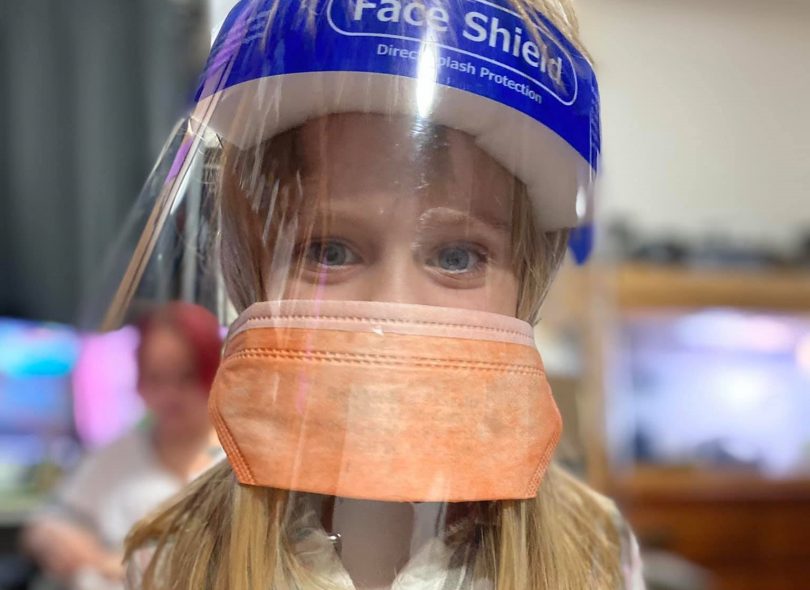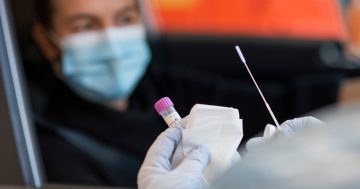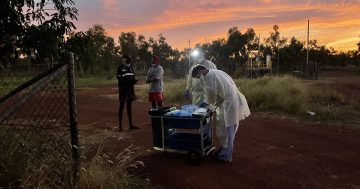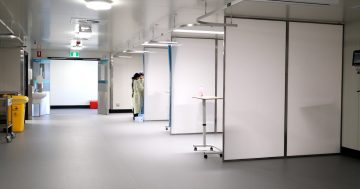
The advice from the experts is to stock up on surgical masks, eye coverings and use them if there’s a COVID-infected person at home. Photo: Tanya Austen.
With over 6000 current cases of COVID-19 active in the Canberra community and even more in the surrounding region of NSW, it’s almost inevitable that many people will, at some point in the near future, become infected with COVID-19 or care for an infected near relative.
First, don’t panic if or when the diagnosis comes through, says infectious disease expert at the ANU Medical School, Professor Peter Collignon.
“For the majority of people, you are only unwell with a headache and a little sniffle,” he says.
But there are a few simple steps you can take to protect yourself and your household.
“Your biggest risk is being close to someone without any protection,” he explains.
To combat this, Professor Collignon suggests wearing a surgical mask (rather than a cloth one as they are less effective) and eye protection – and this goes for both the person who has COVID-19 and the others in the household in the event they do need to get close to the patient.
If the patient cannot wear a mask because of their respiratory symptoms, it’s important the other household members still do so.
If you need to be really close to someone, for example, if you’ve got young children who are anxious and need to be with mum and dad, the more expensive N95 masks might be the most effective option.
Why eye protection? Professor Collignon explains, “our eyes are a very good way of depositing infectious particles and getting infected because everything you deposit in your eyes goes down to your nose”.
“Whether it’s a face-shield or sunglasses or even wraparound glasses – it all decreases your chance of getting it from someone else,” he says.
But Professor Collignon notes that how you care for a person with COVID-19 is largely dependent on how sick they get.
“If they just need support, the bigger distance you can keep from them – at least 1.5 metres – is best,” he says.
The ideal situation is to have the COVID-19 patient in a room with a separate bathroom where they can stay, keep outside air between the infected person and others in the household, and increase ventilation as much as possible.
When full separation isn’t feasible, he says it’s more important that masks are worn, windows are open and meals are eaten outside on a balcony or in the garden (if they can be).
Things become more complicated when there are young children in the household, particularly if it’s a single parent who becomes ill.
“It really depends on the age of the child. A teenager will be different to a three-year-old,” Professor Collignon says.
“When I say these things, what I’m meaning is to be practical.” He suggests sitting outside for cuddles, for example, and ensuring adults wear masks.
“If you’ve got a sick two-year-old, it’s going to be very difficult to keep your distance and you won’t be able to put a mask on them.
“You can’t make the risk zero, but you can decrease it.”
Professor Collignon’s last piece of advice is to be vaccinated. “That goes without saying.”
If a person with COVID-19 becomes extremely unwell, it’s important the healthcare system manages their condition – whether at home or in hospital.
There is a COVID-19 Care@Home program that can support any treatment related to COVID-19 while a person is in isolation.
Current ACT Health advice suggests most people’s symptoms can simply be managed with bed rest, paracetamol, throat lozenges and keeping hydrated.
See the ACT Health website for detailed information on managing a COVID-19 patient at home. Call 000 immediately if anyone with COVID-19 has difficulty breathing or becomes seriously unwell.




















